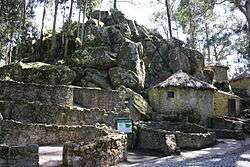Definify.com
Definition 2026
Castro
Castro
Portuguese
Etymology
From castro (“fortification”).
The municipality in Paraná was named after Portuguese minister Martinho de Mello e Castro[1].
Pronunciation
- (Portugal, Carioca) IPA(key): /ˈkaʃ.tɾu/
- (Brazil) IPA(key): /ˈkas.tɾu/
- (South Brazil) IPA(key): /ˈkas.tɾo/
Proper noun
Castro m f
- A habitational surname.
Proper noun
Castro f
References
- ↑ 2006, João Carlos Vicente Ferreira, Municípios paranaenses: origens e significados de seus nomes.
castro
castro
Latin
Etymology
Denominative in -ō from a lost instrumental noun, Proto-Italic *kastrom (“knife”), maybe from Proto-Indo-European *ḱes- (“to cut up, to slaughter”). See also castrum, careō.
Pronunciation
- (Classical) IPA(key): /ˈkas.troː/
Verb
castrō (present infinitive castrāre, perfect active castrāvī, supine castrātum); first conjugation
Inflection
Derived terms
- castrātus
- castrātiō
Descendants
References
- castro in Charlton T. Lewis and Charles Short (1879) A Latin Dictionary, Oxford: Clarendon Press
- castro in Charlton T. Lewis (1891) An Elementary Latin Dictionary, New York: Harper & Brothers
- CASTRO in Charles du Fresne du Cange’s Glossarium Mediæ et Infimæ Latinitatis (augmented edition, 1883–1887)
- Félix Gaffiot (1934), “castro”, in Dictionnaire Illustré Latin-Français, Paris: Hachette.
- Pokorny, Julius (1959) Indogermanisches etymologisches Wörterbuch [Indo-European Etymological Dictionary] (in German), volume II, Bern, München: Francke Verlag, page 586
Portuguese

castro
Pronunciation
Etymology 1
From Old Portuguese castro, from Latin castrum, from Proto-Indo-European *kes- (“to cut, cut off, separate”).
Cognate with Galician castro, Spanish castro and Romanian castru.
Noun
castro m (plural castros)
- fort (of Roman or prehistoric origin)
- a fortified pre-Roman Iron Age village frequently found in the northwestern regions of the Iberian Peninsula
Derived terms
Related terms
See also
- cividade
- citânia
Etymology 2
Verb
castro